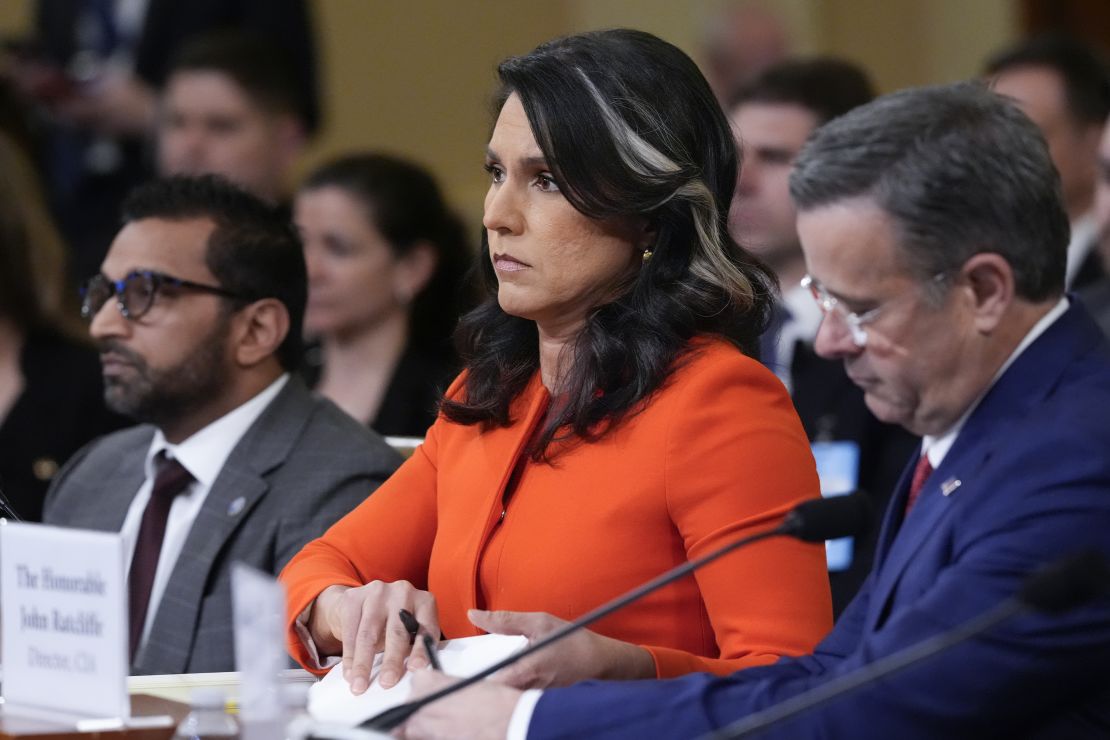CNN
—
As Tulsi Gabbard completed her transformation from a Hawaii Democratic politician to a MAGA surrogate last year, she put down stakes in a far redder state. Gabbard and her husband bought a home outside of Austin and declared under oath last June that they were “resident(s) of the State of Texas.”
But a few months later, Gabbard voted in the 2024 general election back in Hawaii.
Election law experts said Gabbard’s vote, coupled with her claiming a homestead tax break on her Texas home, raises questions about whether she properly cast her ballot and illustrates the complexity of state voting laws.
Gabbard is now director of national intelligence under President Donald Trump. Trump has continued to press false claims of widespread voter fraud and demanded further actions by state and federal authorities to address it.
Representatives for Gabbard said she never intended to abandon her longtime Hawaii residency, despite signing the sworn declaration calling herself a Texas resident.
“Director Gabbard was, is, and intends to remain a Hawaii resident,” Gabbard’s lawyers, Jesse Binnall and Jason Greaves, wrote in a cease-and-desist letter sent to CNN prior to this article’s publication. “That is where she lives, pays taxes, and, of course, votes.”
Under Hawaii voting regulations, when voters have a homeowner’s tax exemption, that home is presumed to be their residence for election purposes.
Gabbard’s attorneys said she applied for a homestead tax exemption, which Texas law only allows on a principal residence, because she “took the advice of local officials” who told her it was required to shield her address from public view. Her office said she was facing a significant security threat.
Gabbard’s representatives did not respond to questions about why she separately swore under oath that she was a Texas resident if she considered herself to still live in Hawaii, and did not provide a comment from her after repeated requests.
It’s not clear whether Gabbard could have run afoul of voting laws in Hawaii or property tax laws in Texas with her actions. In their letter, her attorneys argued that “the definitions of residency for the purpose of voting in Hawaii and for claiming a homestead exemption in Texas are totally different, and on their face, not mutually exclusive.”
But Justin Levitt, a law professor at Loyola Marymount University who studies election law, said Gabbard’s vote raised “a bunch of questions.”
“If she voted in Hawaii without actually living up to Hawaii’s eligibility standard, then that’s a problem,” said Levitt, who served as a voting policy adviser in the Biden administration. “Alternatively, if she always meant to keep Hawaii as home, that could well be a problem for that Texas tax exemption.”
Hawaii law says that individuals can only have a single residence for election purposes, and defines a voter’s residence as the “place in which the person’s habitation is fixed, and to which, whenever the person is absent, the person has the intention to return.”
If a voter has more than one dwelling, there is a “presumption” that a voter’s residence is the dwelling that is “subject to the homeowner’s property tax exemption,” state voting regulations say. There is also a presumption that if a voter takes up a new dwelling in another state, that new dwelling is their residence. The regulations allow voters to present evidence that they should still be allowed to vote in Hawaii.
Lance Collins, a Hawaii lawyer who has worked on multiple cases in the state in which voters challenged an elected official’s residency, said he thought Gabbard could face a challenge to her registration or an investigation into her vote in the 2024 election.
Under Hawaii law, voters keep their residency “until you take some affirmative action to abandon it,” Collins said. “Requesting a homestead exemption in another state is strong evidence of an intention to abandon.”
Gabbard, who grew up in Hawaii, has a long political history in the state. She became the youngest person ever elected to the state legislature at age 21, before being deployed to Iraq and Kuwait while serving in the state’s Army National Guard. Gabbard represented Hawaii in Congress as a Democrat between 2013 and 2021, and ran for president in the 2020 Democratic primary, eventually dropping out and endorsing Joe Biden.
After leaving elected office, Gabbard made a hard turn to the right, working as a Fox News contributor and endorsing and campaigning for Trump last year at events around the US. On the campaign trail, she echoed some of Trump’s rhetoric about election security, calling voting integrity “a serious concern and a serious issue” at one Trump campaign event in Las Vegas last fall.
In March 2024, Gabbard and her husband, Abraham Williams, bought a home in the Austin suburb of Leander, Texas, according to property records.
Several months later, in June, Gabbard and Williams declared under oath before a notary public that “we are resident(s) of the State of Texas,” and their Leander home was “designated as the family homestead,” according to a public document filed in Travis County, Texas, the following month.
Texas law allows some property owners, including public officials, servicemembers and veterans, to apply to have their address information made confidential in government appraisal records. Gabbard’s office said she sought that protection because her Texas house had been doxxed online, and she was facing a security threat.
Information related to Gabbard’s address has been blocked in Travis County records. A spokesperson for the Travis County appraisal district confirmed that only property owners who have applied and been approved for a homestead tax exemption are eligible for the protection.
“It is state law,” the spokesperson, Cynthia Martinez, said in an email. “A homestead exemption can only be claimed on a property that a person owns and occupies as their primary residence. The attorney general has clarified that the confidentiality protections under state law only apply to a homesteaded property.”
However, a “Designation of Homestead” – the type of document Gabbard signed swearing that she was a Texas resident – isn’t required in order to get a homestead exemption or to be part of the confidentiality program, Martinez said. The designation document has “nothing to do with a homestead exemption,” she said. It’s not clear why Gabbard filed it.
Making a false statement on a homestead exemption application, meanwhile, could lead to misdemeanor or lower-level felony charges, according to the state comptroller’s office.
Thanks to a homestead exemption, the annual property taxes for Gabbard’s house, which was assessed at a value of nearly $565,000, were reduced by about $1,200, according to a CNN analysis of a November bill from the Travis County Tax Office.
However, Gabbard likely would have benefited from the tax break in 2024 even if she hadn’t claimed the homestead exemption herself. The previous property owner also had a homestead exemption, and property taxes are typically calculated based on exemptions that were on the books on January 1 of each year, Martinez said.
Theoretically, Gabbard could also substantially cut her taxes by claiming Texas residency because the Lone Star State doesn’t tax income, while Hawaii has one of the highest income tax rates in the US. But Gabbard’s lawyers said she pays her taxes in Hawaii and intends to remain a Hawaii resident.
Sean Bukowski, a real estate lawyer in Texas, said that only Texas residents who make the state their primary residence can receive the homestead tax exemption.
“It is supposed to be your main homestead – that’s the whole point,” he said. If Gabbard considered herself a Hawaii resident, “she shouldn’t be getting a homestead exemption with the county for her taxes (in Texas), because that’s not her homestead.”
Gabbard’s press interviews and social media increasingly showed her in Texas in the months before and after the election. About halfway through 2024, Gabbard’s background on some of her frequent Fox News appearances changed from the slope of Oahu’s Diamond Head crater to a view of the Texas State Capitol building in Austin. And her social media posts have shown glimpses of her spending time in the Lone Star State, like videos she posted of herself at a shooting range and gym outside Austin.
The financial disclosure that Gabbard filed in January after being nominated as intelligence director also lists a mortgage described as being for a “Personal Residence” that matches details of the couple’s mortgage on the Leander home.
Gabbard has not registered to vote in Travis County, a spokesperson for the county said.
A spokesperson for the Honolulu Elections Division said last month that Gabbard was actively registered to vote in Honolulu County. She’s rented a home on Oahu for about a decade, according to her landlord, who asked not to be named. While she has often been away from Hawaii in the mainland US in recent years, the landlord said, “she keeps paying me the rent.”
Another provision in the Hawaii voting regulations says that registered voters who are “employed in the service of the United States” can continue to vote in Hawaii while living out of state, even if their intent to return is “uncertain.” Gabbard is serving in the Army Reserve as a part-time commander of a battalion based in Tulsa, Oklahoma.
But Collins, the Hawaii voting lawyer, said he wasn’t sure if there was any relationship between Gabbard “living in the state of Texas and her part-time service in the Army Reserves in some other state.”

Gabbard isn’t the only member of Trump’s Cabinet who’s faced residency questions related to their vote in last year’s election. Health and Human Services Secretary Robert F. Kennedy Jr. cast a ballot in New York State, even though a judge ruled last summer that he could not appear on the state’s presidential ballot because he used a “sham” address to claim New York residency. Kennedy had listed his address as a New York home he rented from a friend, even though he admitted having slept there only once, and largely spent his time in California, the judge concluded. Kennedy’s appeal of the ruling was not successful.
A liberal watchdog group, Accountable.US, filed a petition with the New York Division of Election Law Enforcement in January accusing Kennedy of violating state law. The division declined to comment about the status of the claim or whether it was investigating Kennedy.
Gabbard, meanwhile, could theoretically face a voter challenge to her Hawaii registration, or an investigation into her decision to vote in the state or her Texas homestead exemption.
Camron Hurt, the program director for Common Cause Hawaii, a non-partisan government watchdog group, said that while Gabbard’s declaration of Texas residency wasn’t “conclusive of wrongdoing,” it was “concerning.”
“As a public servant and high-profile figure, an explanation is owed,” Hurt said. “If circumstances warrant, Ms. Gabbard should be held accountable for her actions.”

